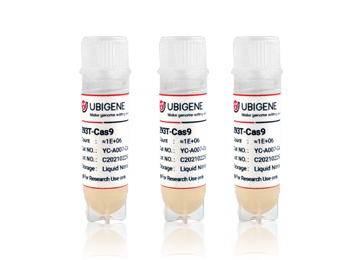Location:Home > Application > IF=12.4|Gene KO THP-1 Cells Help Reveal New Targets For The Treatment Of Viral Pneumonia | Ubigene
IF=12.4|Gene KO THP-1 Cells Help Reveal New Targets For The Treatment Of Viral Pneumonia | Ubigene

Viral pneumonia is one of the major public health issues globally. In severe cases of infection, viral pneumonia can trigger cytokine storms and severe lung inflammation, causing deaths of clinical cases. However, the current treatment methods for viral pneumonia still pose significant challenges. Therefore, it is essential to identify more effective treatment methods.
Recently, Dr. Wenjun Liu's team and the Institute of Microbiology, Chinese Academy of Sciences, published a research paper titled “The extracellular cyclophilin A-integrin β2 complex as a therapeutic target of viral pneumonia” on Molecular Therapy (IF=12.6). This research found that the extracellular cyclophilin A (eCypA)-integrin β2 signal mediates virus-induced inflammatory responses and demonstrated that the eCypA-integrin β2 complex is a potential target for the treatment of viral pneumonia. Specifically, they used PPIA gene knockout THP-1 cells and BSG gene knockout THP-1 cells established by Ubigene to evaluate the roles of CypA and CD147 in virus-induced inflammatory responses.
Cyclophilin A (CypA) is an important regulator of the immune response and is primarily distributed in the cytoplasm. Under conditions of hypoxia, infection, and oxidative stress etc., CypA can also be secreted outside the cell. Previous research found that intracellular CypA is an important pro-inflammatory factor (eLife, 2017; Cell Reports, 2021; FASEB J, 2021; Cell Reports, 2022; Frontiers in Immunology, 2022; iScience, 2023). While this study focused on the role of virus-induced secreted eCypA in the inflammatory process.
The researchers found that both A and B type influenza viruses and SARS-CoV-2 can induce increased secretion of eCypA in clinical patients, mice, or cells, and eCypA can promote inflammatory responses. Mechanistically, virus-induced eCypA binds to integrin β2 which is mainly expressed on leukocytes, triggering integrin activation, and then promoting leukocyte migration and pro-inflammatory cytokine expression through the FAK/GTPase and FAK/ERK/P65 signaling pathways. The researchers successfully reduced the production of pro-inflammatory cytokines such as IL-1β, IL-6, and TNF-α, leukocyte infiltration, and lung injury in virus-infected mice by blocking the interaction between eCypA and integrin β2 with a eCypA-targetd specific monoclonal antibody. Importantly, PPIA gene knockout THP1 cells and BSG gene knockout THP1 cells established by Ubigene were used to investigate the role of eCypA in virus-induced inflammatory responses. These results indicate that the signaling pathway activated by the binding of eCypA to integrin β2 plays a critical role in virus-induced inflammatory responses, and the eCypA-targeted antibody can effectively inhibit the overactive inflammatory response induced by the virus. Therefore, blocking the binding of eCypA to integrin β2 is an effective approach for the treatment of viral pneumonia, and related research results have been granted a Chinese Invention Patent (ZL202311469423.3). Additionally, this research also provides insights for the treatment of other inflammatory diseases and offers a new direction for the development of anti-inflammatory drugs.

Reference
Bai X, Yang W, Zhao Y, et al. The extracellular cyclophilin A-integrin b2 complex as a therapeutic target of viral pneumonia. Molecular Therapy. 2024;32(5):1-16.


IF=12.4|Gene KO THP-1 Cells Help Reveal New Targets For The Treatment Of Viral Pneumonia | Ubigene

Viral pneumonia is one of the major public health issues globally. In severe cases of infection, viral pneumonia can trigger cytokine storms and severe lung inflammation, causing deaths of clinical cases. However, the current treatment methods for viral pneumonia still pose significant challenges. Therefore, it is essential to identify more effective treatment methods.
Recently, Dr. Wenjun Liu's team and the Institute of Microbiology, Chinese Academy of Sciences, published a research paper titled “The extracellular cyclophilin A-integrin β2 complex as a therapeutic target of viral pneumonia” on Molecular Therapy (IF=12.6). This research found that the extracellular cyclophilin A (eCypA)-integrin β2 signal mediates virus-induced inflammatory responses and demonstrated that the eCypA-integrin β2 complex is a potential target for the treatment of viral pneumonia. Specifically, they used PPIA gene knockout THP-1 cells and BSG gene knockout THP-1 cells established by Ubigene to evaluate the roles of CypA and CD147 in virus-induced inflammatory responses.
Cyclophilin A (CypA) is an important regulator of the immune response and is primarily distributed in the cytoplasm. Under conditions of hypoxia, infection, and oxidative stress etc., CypA can also be secreted outside the cell. Previous research found that intracellular CypA is an important pro-inflammatory factor (eLife, 2017; Cell Reports, 2021; FASEB J, 2021; Cell Reports, 2022; Frontiers in Immunology, 2022; iScience, 2023). While this study focused on the role of virus-induced secreted eCypA in the inflammatory process.
The researchers found that both A and B type influenza viruses and SARS-CoV-2 can induce increased secretion of eCypA in clinical patients, mice, or cells, and eCypA can promote inflammatory responses. Mechanistically, virus-induced eCypA binds to integrin β2 which is mainly expressed on leukocytes, triggering integrin activation, and then promoting leukocyte migration and pro-inflammatory cytokine expression through the FAK/GTPase and FAK/ERK/P65 signaling pathways. The researchers successfully reduced the production of pro-inflammatory cytokines such as IL-1β, IL-6, and TNF-α, leukocyte infiltration, and lung injury in virus-infected mice by blocking the interaction between eCypA and integrin β2 with a eCypA-targetd specific monoclonal antibody. Importantly, PPIA gene knockout THP1 cells and BSG gene knockout THP1 cells established by Ubigene were used to investigate the role of eCypA in virus-induced inflammatory responses. These results indicate that the signaling pathway activated by the binding of eCypA to integrin β2 plays a critical role in virus-induced inflammatory responses, and the eCypA-targeted antibody can effectively inhibit the overactive inflammatory response induced by the virus. Therefore, blocking the binding of eCypA to integrin β2 is an effective approach for the treatment of viral pneumonia, and related research results have been granted a Chinese Invention Patent (ZL202311469423.3). Additionally, this research also provides insights for the treatment of other inflammatory diseases and offers a new direction for the development of anti-inflammatory drugs.

Reference
Bai X, Yang W, Zhao Y, et al. The extracellular cyclophilin A-integrin b2 complex as a therapeutic target of viral pneumonia. Molecular Therapy. 2024;32(5):1-16.


